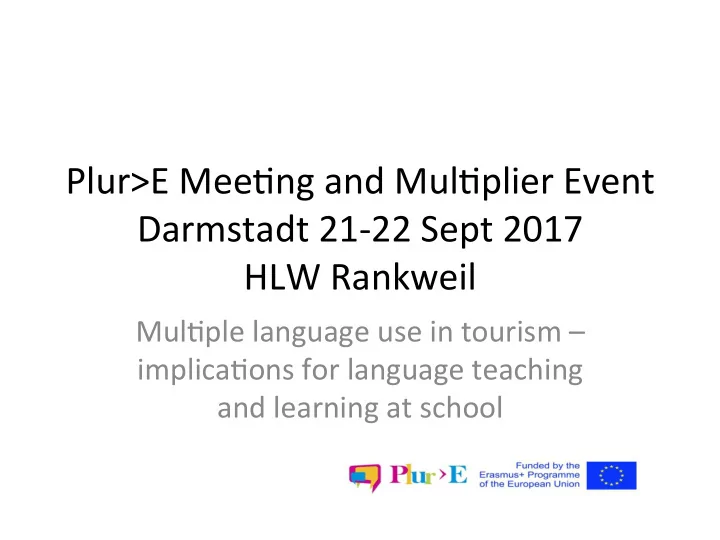

Plur>E ¡Mee*ng ¡and ¡Mul*plier ¡Event ¡ Darmstadt ¡21-‑22 ¡Sept ¡2017 ¡ ¡ HLW ¡Rankweil ¡ Mul*ple ¡language ¡use ¡in ¡tourism ¡– ¡ implica*ons ¡for ¡language ¡teaching ¡ and ¡learning ¡at ¡school ¡
HLW ¡Rankweil/Austria ¡ • Voca*onal ¡College ¡+ ¡A-‑levels ¡ • Languages: ¡German, ¡English, ¡French, ¡Spanish/ Italian ¡ • CLIL ¡in ¡PE ¡classes ¡(French) ¡ • CLIL ¡in ¡Marke*ng ¡ • Work ¡placement ¡between ¡years ¡3 ¡and ¡4 ¡
Students‘ ¡work ¡placement ¡in ¡tourist ¡ industries ¡ • Dura*on: ¡3 ¡months ¡ • Countries: ¡France, ¡Belgium, ¡Ireland, ¡Scotland, ¡ Italy, ¡Spain ¡ • Compulsory ¡ • Financially ¡supported ¡by ¡Erasmus+ ¡
Plur>E-‑Project ¡ Phase ¡1: ¡October ¡2015 ¡+ ¡October ¡2016 ¡ Student ¡ques*onnaire ¡on ¡work ¡placement ¡and ¡ mul*ple ¡language ¡use ¡ ¡ Phase ¡2: ¡2016 ¡ Summary ¡and ¡evalua*on ¡of ¡results ¡ ¡ ¡
Mul*lingual ¡a^tudes ¡a_er ¡work ¡ placement ¡ ¡ Ques%ons: ¡ 1. Switching ¡= ¡fun ¡ ¡ ¡ ¡ ¡ ¡ ¡ ¡ ¡ ¡ ¡ ¡ ¡high ¡agreement ¡ 2. Switching ¡= ¡hard ¡work ¡ 3. English ¡only ¡= ¡more ¡efficient ¡communica*on ¡ 4. Only ¡one ¡language ¡needed ¡ ¡ ¡ ¡high ¡disagreement ¡ 5. School ¡mul*competence ¡training ¡ ¡ ¡high ¡agreement ¡ 6. Use ¡of ¡dominant ¡language ¡ 7. Keeping ¡L ¡separate ¡= ¡diffIcult ¡ 8. Higher ¡flexibility ¡in ¡oral ¡use ¡ ¡ ¡ ¡high ¡agreement ¡ 9. Code-‑mixing ¡outside ¡school ¡ ¡ ¡ ¡high ¡agreement ¡ 10. Knowing ¡1 ¡L ¡well ¡= ¡bejer ¡than ¡ ¡ ¡ ¡high ¡disagreement ¡ knowing ¡several ¡languages ¡ ¡ ¡ ¡ ¡
Mul*lingual ¡experience ¡ Code ¡mixing ¡ is ¡not ¡only ¡due ¡to ¡low ¡proficiency ¡in ¡a ¡ language ¡but ¡becomes ¡a ¡habit: ¡ – E.g. ¡because ¡certain ¡expressions ¡become ¡part ¡of ¡ everyday ¡conversa*ons: ¡ o Manche ¡Redewendungen ¡waren ¡schon ¡so ¡normal ¡und ¡ gewohnt ¡von ¡der ¡Arbeit ¡(F), ¡dass ¡sie ¡manchmal ¡ dazwischen ¡rutschten, ¡wenn ¡wir ¡uns ¡untereinander ¡ unterhalten ¡haben ¡(Ger) ¡(2015: ¡4B/24) ¡
Mul*lingual ¡experience ¡ ¡ • „I ¡used ¡all ¡the ¡languages ¡in ¡my ¡repertoire“: ¡ à ¡Total ¡agreement ¡is ¡above ¡all ¡high ¡in ¡Spain ¡and ¡Italy ¡(where ¡ students ¡also ¡rely ¡on ¡their ¡stronger ¡languages ¡such ¡as ¡French ¡ or ¡English ¡when ¡communica*ng). ¡In ¡GB, ¡the ¡‚weaker‘ ¡ languages ¡are ¡not ¡used ¡to ¡the ¡same ¡degree. ¡ Getraut ¡in ¡allen ¡Sprachen ¡ak*v ¡zu ¡werden ¡ (Spanien) ¡ Getraut ¡in ¡allen ¡Sprachen ¡ak*v ¡zu ¡werden ¡ (Italien) ¡ 90.00 ¡ 80.00 ¡ 120.00 ¡ 70.00 ¡ 100.00 ¡ 60.00 ¡ 80.00 ¡ 50.00 ¡ 60.00 ¡ 40.00 ¡ 40.00 ¡ 30.00 ¡ 20.00 ¡ 20.00 ¡ 10.00 ¡ 0.00 ¡ Meistens% ¡ Manchmal% ¡ Selten% ¡ Nie% ¡ 0.00 ¡ Meistens% ¡ Manchmal% ¡ Selten% ¡ Nie% ¡
The ¡role ¡of ¡English ¡ ¡ • Default ¡supplier ¡language ¡to ¡fill ¡lexical ¡gaps ¡ • Default ¡supplier ¡language ¡for ¡lexical ¡ inven*ons ¡ • Lingua ¡franca ¡ • Language ¡of ¡communica*on ¡as ¡long ¡as ¡F/Sp/It ¡ ¡ proficiency ¡is ¡(perceived ¡as) ¡not ¡sufficient ¡ • The ¡(foreign) ¡language ¡connected ¡with ¡the ¡ feeling ¡of ¡„security“ ¡
Challenges ¡in ¡connec*on ¡with ¡ language ¡use ¡ ¡ ¡ Foreign ¡language ¡anxiety ¡ ¡Specific ¡vocabulary ¡used ¡in ¡tourism ¡ ¡Specific ¡terms ¡used ¡at ¡the ¡work ¡place ¡(e.g. ¡ ¡abbrevia*ons) ¡ Structures ¡(e.g. ¡tenses) ¡ ¡
Phase ¡3 ¡Prepara*on ¡of ¡teaching ¡ material ¡and ¡teaching ¡units ¡ ¡ • February ¡through ¡April ¡2017 ¡ • Several ¡mee*ngs ¡of ¡the ¡Plur>E ¡team ¡ • Edi*ng ¡of ¡material ¡ – Involving ¡teacher ¡assistants ¡ – Involving ¡other ¡teachers ¡
Phase ¡4 ¡Mul*lingual ¡prepara*on ¡ ¡ part ¡1 ¡ June ¡1 ¡(3 ¡lessons): ¡Languages ¡E, ¡F, ¡Sp, ¡It ¡ Session ¡one: ¡conversa*on ¡prac*ce ¡in ¡(target) ¡language ¡ ¡ ¡ hobbies, ¡family, ¡personal ¡presenta*on ¡ ¡ ¡ ¡health ¡ ¡ ¡clothes, ¡colours ¡ ¡ ¡numbers ¡ Session ¡two: ¡Mul*lingual ¡conversa*on ¡prac*ce ¡ ¡ ¡ bar ¡and ¡restaurant ¡ ¡ ¡recep*on ¡ ¡ ¡ ¡ ¡ ¡ ¡ ¡ ¡
Phase ¡4 ¡Mul*lingual ¡prepara*on ¡ ¡ part ¡2 ¡ June ¡2, ¡2017 ¡(3 ¡lessons), ¡4 ¡languages ¡ Session ¡one: ¡Mul*lingual ¡conversa*on ¡and ¡discussion ¡ prac*ce ¡ ¡ ¡ Bar ¡and ¡restaurant ¡ ¡ ¡Recep*on ¡ Session ¡two: ¡Prac*ce ¡in ¡individual ¡(target) ¡languages ¡ ¡Descrip*on ¡of ¡town ¡ ¡Hotel ¡descrip*on ¡ ¡Revision ¡of ¡numbers, ¡*mes ¡of ¡the ¡day ¡ ¡ ¡Shopping ¡ ¡ ¡ ¡ ¡ ¡ ¡
Intensive ¡interac*on ¡in ¡one ¡(target) ¡ language ¡
Mul*lingual ¡conversa*on: ¡switching ¡ tables-‑switching ¡languages ¡
Spontaneous ¡role ¡playing ¡
Feedback ¡ • Feedback ¡ students ¡ – Enthusias*c ¡ ¡ – „very ¡helpful“ ¡ ¡ – „changing ¡languages ¡great ¡– ¡never ¡done ¡it ¡before“ ¡ – „mo*va*ng ¡because ¡we ¡need ¡this ¡for ¡our ¡work ¡ placement“ ¡ – „meaningful ¡– ¡results ¡of ¡the ¡survey ¡showed ¡how ¡ important ¡mul*ple ¡language ¡use ¡is“ ¡ • Feedback ¡ teachers ¡ – Generally ¡very ¡posi*ve; ¡teachers ¡want ¡to ¡use ¡the ¡ material ¡next ¡year ¡as ¡well ¡
Future ¡developments ¡ • Material ¡will ¡be ¡re-‑used ¡and ¡expanded ¡ • Reflec*on ¡on ¡mul*ple ¡language ¡use ¡during ¡ work ¡placement ¡has ¡been ¡integrated ¡in ¡ individual ¡poruolios ¡ • Connected ¡teaching ¡of ¡first ¡and ¡second ¡ foreign ¡language ¡(English/French) ¡during ¡final ¡ year ¡planned ¡(current ¡curriculum) ¡
Erasmus ¡+/Plur>E ¡
Recommend
More recommend